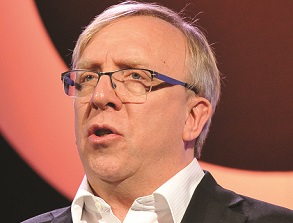Long-term plan: reaction
Chris Hopson (pictured), chief executive of NHS Providers, said: 'There will be strong support across the NHS for the vision and ambition set out in the document. Trusts and their staff are strongly committed to creating world class services and continuously improving patient outcomes. They also recognise the need to transform the way they provide care to reflect 21st century health and care needs.’
There was a lot to do and successful delivery depended on four factors, he added.
‘First, ruthless prioritisation and effective implementation. To plan is to choose. We now need a detailed implementation plan that sets out exactly what will be delivered when. This must clearly match the priorities for each year to the available money and staff, ensuring that the trusts who have to deliver the plan are actually able to do so.
‘Second, a rapid solution to current workforce shortages. This plan cannot be delivered whilst trusts still have 100,000 workforce vacancies. We need urgent action to solve what trust leaders current describe as their biggest problem.
‘Third, a clear path to recovering performance in areas like urgent and emergency care and routine surgery. Despite trusts working flat out, the NHS has fallen behind where it needs to be, missing all its key performance targets over the last four years. Whilst trusts are ready to look at updating these targets, we mustn’t lose the enormous gains trusts made in cutting waiting lists and improving care in the early 2000s.
‘Fourth, there are a range of other issues central to the success of the NHS that must be satisfactorily resolved through the spending review – social care, public health and NHS training budgets.’
Richard Murray, chief executive at the King’s Fund said the plan was ambitious and could improve the lives of many people.
However, the plan had missed some important issues, he added: ‘While NHS leaders have done what was asked of them within the constraints of the funding settlement provided by the government, some significant pieces of the jigsaw are still missing. A number of decisions – notably on hospital waiting times – have been postponed, indicating that trade-offs and difficult choices lie ahead.'
He was also concerned about workforce. ‘Whether the plan can be delivered relies critically on tackling workforce shortages. While the plan recognises this, commitments to increase international recruitment depend on decisions about immigration policy and we will need to wait for solutions until a new workforce plan is published later this year.
‘The NHS and social care are two sides of the same coin, yet publication of the social care green paper has been delayed yet again. And while commitments for the NHS to do more promote public health are welcome, cuts to local government funding for public health services underline the need for a more consistent approach across government to the population’s health.’
Nuffield Trust Chief Executive Nigel Edwards (pictured) warned of pitfalls ahead. ‘The extra funding will actually be below the historic average and what experts thought was needed,’ he said. ‘It’s enough to move forwards, but with little room for manoeuvre. If we face a no deal Brexit, the extra costs and tasks required would eat up the first instalments, stopping progress dead in its tracks.
‘The last few years have seen repeated cuts to public health and social care. The reforms we all know are needed to the way we pay for care have been kicked into the long grass again and again. If this goes on, the NHS will be stretched still further as it looks after more people who couldn't find the help they needed.
A shortage of staff was the biggest single issue, but the levers to resolve the workforce crisis are out of NHS England’s hands. ‘Only bold policies on training, immigration and Brexit can deliver enough nurses, GPs and therapists for the next few years. The system of workforce planning has failed us, and needs deep reform,’ he said.
Health Foundation chief executive Jennifer Dixon said the plan was pragmatic and an ambitious vision to improve NHS care. But making it a reality will be extremely tough given growing pressures on services, widespread staff shortages and continued cuts to other parts of the health and care system.
'The plan outlines a positive shift in the model of NHS care, towards an increasing focus on preventing people becoming ill in the first place, reducing avoidable demand, and narrowing unjust gaps in health between the best and worst off. This is particularly welcome given life expectancy improvements are stalling and health inequalities widening.
'It also makes welcome commitments to improve care in key service areas – including cancer, maternity and mental health – and to continue longstanding work to coordinate local services better.’
The growing crisis in social care must be resolved, she said. 'Without a solution to the growing crisis in social care, people will continue to suffer, and more pressure will be piled on the NHS. Without additional funding for public health, which runs services that are essential for keeping people healthy and reducing health inequalities, NHS plans in these areas risk stalling. The Health Foundation has calculated that an additional £3.2bn a year is required to reverse the impact of cuts to the public health grant and ensure that it is re-allocated according to need.’
Related content
We are excited to bring you a fun packed Eastern Branch Conference in 2025 over three days.
This event is for those that will benefit from an overview of costing in the NHS or those new to costing and will cover why we cost and the processes.